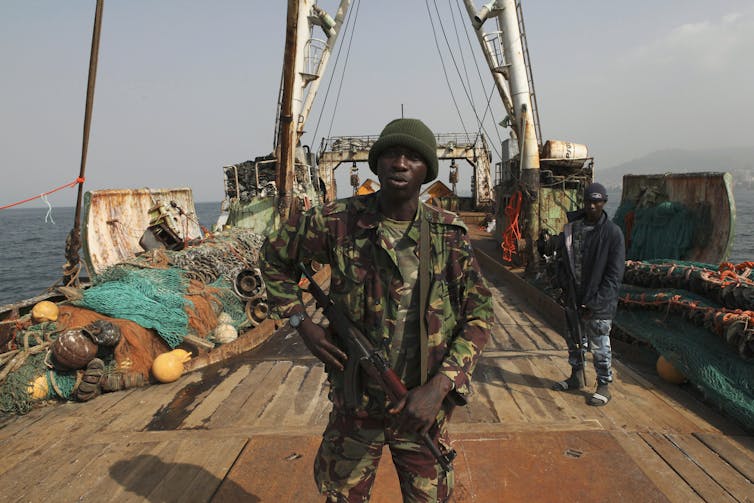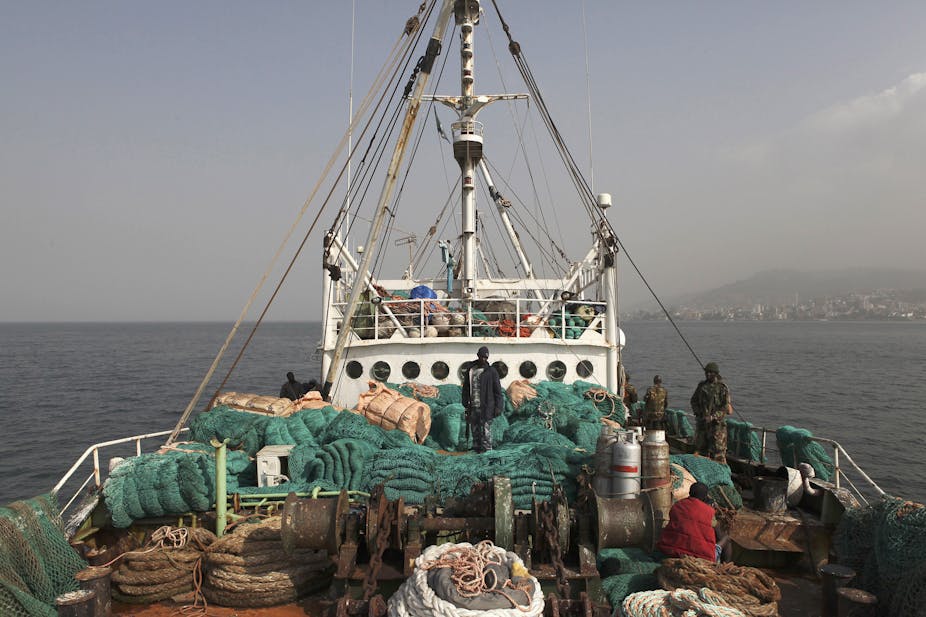Around 6.7 million people depend directly on small-scale fisheries in West Africa. In the past, fisheries were an appealing refuge. But the sector is beset with challenges including over-fishing and, in particular, illegal fishing.
This has driven traditional fisher-folks and their households deeper into poverty with people surviving on less than $1 a day.
Fisheries contribute around $3 billion annually to African economies. But over-exploitation, driven by extensive industrial fishing in the 1970s and illegal fishing by European and Asian vessels, has led to the collapse of valued fish stocks off the West African coast. And the region continues to face pressure from big competing fishing companies from all parts of the world whose main focus is exporting the fish elsewhere.
Those most affected are coastal populations who rely on fish as the main provider of protein, employment and livelihood. According to the Food and Agriculture Organisation of the United Nations people in the region on average eat 17.5 kg per person annually. In reality they eat 35 kg of fish annually, which is calculated from the Sea Around Us database. This means that people get enough protein from fish to cover most of their needs.
This is why it’s vital that traditional fisheries in the region are prioritised and protected.
Under-reported and under-appreciated
The importance of traditional fisheries, or small-scale fisheries, is downplayed because catches are under reported. As a result the revenue they generate is not perceived as important. In many instances the catches landed by traditional fishers go under the radar. They simply appear on the local markets and most never land on official charts.
For every kilogram of fish recorded at landing sites, another kilogram escapes official accounting. This statistic is based on five years of investigative work I performed on the region. The under-reporting is a problem because the value is not accounted for. What this means is that officially, traditional fisheries are perceived as not being economically important. In addition, the fact that they generate enough protein for local populations is missed.
For example, during the Ebola crisis in Sierra Leone staff from the ministry of fisheries reported that fish consumption increased. People saw fish as the safest source for animal protein. But official figures didn’t reflect this, giving the impression that fish played no role at all in preventing people from eating infected bushmeat. Yet one study shows that the tendency to chose fish over bushmeat is real.
This underscores why fisheries should be protected.
The bigger danger is that important decisions are being made without vital information. Because the contribution of traditional fisheries is barely recognised, governments make decisions that are detrimental to smaller fishermen. These include:
allowing more people to fish,
subsidising more fishing, and
prioritising big fishing boats that often compete with the small traditional ones.

Exploitation by big players
Bigger boats are problematic on two fronts. The first is that they exercise more pressure on already over-exploited fish stocks. What’s been harvested outstrips the ability of stocks to regenerate.
Secondly, the revenue generated by these catches doesn’t make it back into state coffers. Boats from China and Europe caught fish valued at $8.3 billion in a ten year time period from the region. Only a tiny fraction - $0.5 billion - went back into local economies.
In addition, fishing stock worth as much as $2 billion is either taken without prior consent from local governments or never reported due to illegal, unreported and unregulated fishing.
Big Chinese fishing vessels have been reported plundering the waters off the west African coast. An example of this is the bandit six story in which six fishing vessels were reported to have been fishing illegally for toothfish in the region. The men tried to find refuge in West Africa as they were on list of Interpol’s most wanted fishing vessels.
But most culprits do not get media attention.
Research shows that China is heavily involved in illegal fishing. Europe and Russia, along with other east Asian countries, also operate illegally in the region. A Spanish boat Gotland was recently caught fishing illegally in Senegalese waters.
High levels of corruption and weak governance are to blame for the high rate of undetected and hence unpunished illegal, unreported and unregulated fishing activities. The good news is that the region is witnessing major shifts associated with higher international visibility and increased research interest.
Guinea announced at the Committee on Fisheries at the Food and Agriculture Organisation that it has adopted new regulations to fight illegal fishing. As a disincentive against illegal fishing Senegal has amended legislation to make it possible for the imposition of historical fines. And Gambia has stopped all industrial fishing until more comprehensive legislation is adopted.
Positive incentives like increased international cooperation to combat illegal fishing, increased investment in fisheries monitoring and protecting coastal waters by creating protected areas are becoming popular worldwide.
But for these efforts to bear fruit, small-scale fisheries should regain their role. In addition, industrial fisheries should become a tool for economic development rather than fish stock plunder.


